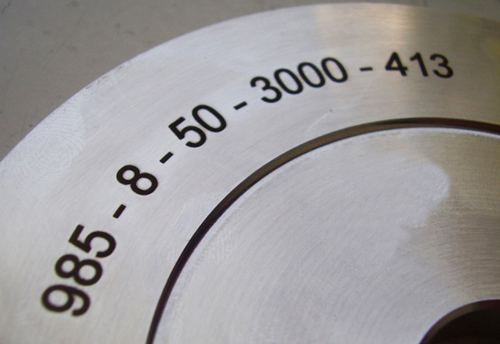Fiber laser marking machine for stainless steel
Stainless steel is a kind of modern general engineering material. It can be used in various industries. From the daily consumer products to the kitchen wares, from manufacturing the surgical operation device to the roof, stainless steel is always the best choice. There are over 150 types of stainless steels which can be purchased from the market. Their surface smoothness is also in great varieties. When the fiber laser marking technology is used on various stainless steel materials, there will be amazing effect. Many products or components made of stainless steel require marks of certain forms. No matter these marks are the manufacturing date or the simple alphanumeric code indicating the component number, or even the more complicated bar code or data bar code, ATO fiber laser marking machine can make marks without exception. The fiber laser marking machine can mark the typefaces in single lines, in hollow or solid. Some marks are rather complicated, such as the functional marks like the scales on the tools or instruments. Furthermore, the fiber laser marking machine can still engrave more complicated decorative patterns.
The fiber laser marking machine is small in size. But it can generate the nanosecond-level monopulse, with the light concentration of 10~40W, so as to enable the stainless steel surface to have visible changes under the premise that the main stainless steel material is not impacted by the heat. When it is used with the photoelectric scanner, the laser will be utilized effectively to carve and print different patterns. According to the characteristics of the incident light and the stainless steel type, as well as the different reaction of the stainless steel to the laser, various visible effects can be obtained. The impulse with enough energy can be used to melt the partial surface, and then the laser will make the surface to generate a series of small pitting, which will have chemical reaction with the oxygen in the air, thus forming the touchable black marks. When the impulse increases, some materials will be evaporated. The melt in the pitting will be extruded out because of the pressure, so as to have a flashing effect and improve the visual quality significantly, thus having a carving sense.
If rather low energy strength is used, a long reaction time will bring a total different effect. Under the premise of not melting the metal, a surface mark of annealing spot in dark color will be formed. To be more accurate, it is the black oxidation spot with high contrast, with no influence to the surface roughness and structure of the material. Such marks are usually widely used in the daily consumer products, or the medical surgical operation tools with strict requirements on marks, so as to make sure that the tools will not erode after repeated sterilization. The flexibility and the generated controllable impulse of the fiber laser marking machine make all these surface marks to become true.
Fiber laser marking machine can still make pure white marks on the stainless steel. In addition, through controlling the laser energy, the very short low-energy impulse can be used to generate very small fondant, so that it can print the grind before oxidation and generate solid and white marks. Because of its elegant appearance, it is usually used for the daily consumer products, such as the camera and mobile phone. The mark of this type will generate obvious influence to the physical characteristics of the material, such as the waterproof performance of the material.
The same as the traditional printing, changing the density of the spot or the energy strength will also change the gray mark effect.
Fiber laser marking machine has another application, which is to use the very short and biggest repetitive rate low-energy impulse in 1MHz to polish the stainless steel with the surface wiredrawing process. Such a way will melt the dimpling part of the texture surface of the wiredrawing process. The remelting generated herein will be able to polish the material effectively, thus making the material to have the effect of reflecting light.

